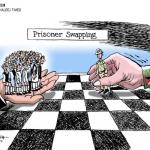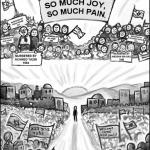A Difficult Decision to Make:
The Jewish world was overjoyed at the news that Gilad Shalit, the IDF soldier who was kidnapped and held captive for five years in Gaza, would return home. For many, it seemed as a triumph for the Jewish appreciation of the preservation of every human life. Then why, according to Prime Minister Benjamin Netanyahu, was this “a difficult decision to make?” What are the moral implications of prisoner exchanges and how did the five-year negotiation for the release of Gilad Shalit challenge those who were a part of the decision and Israeli society as a whole? How can we understand the considerations that go into such a decision in a society for which its ramifications are matters of life and death?

Program Description
Questions to consider:
- What do you think, from the Prime Minister’s perspective, is difficult about this decision?
- What do you think about the emotional tone of his statement and how it reflects the decision he (with the help of others) had to make?
- Why do you think he spoke about leadership being “examined”? What role does leadership play in this decision?
- Why do you think the Prime Minister chose to acknowledge his family by name?
Note to Educators: For the following activity, in addition to the articles that students will analyze, it will be helpful for them to have some background on what the experience of the protracted negotiation was like for Israeli society. The following pieces (as well as others under “Background Resources”) can help you and your learners better understand the 1,940 days that Gilad Shalit was in captivity:
- See a timeline of events, published in Ha’aretz, from Gilad Shalit’s capture to his release can help establish the key dates during the time of his captivity.
- This Jerusalem Post article outlines Gilad Shalit’s experience on the day that he was captured.
- The following video was taken as Gilad Shalit was released.
Understanding Different Points of View in Weighing the Moral Obligation to Human Life
Bringing Gilad Shalit home was supported by the majority of Israelis. The idea that Israelis “leave no person behind” resonated as a value that Jews embrace. In fact, the Mishna (Sanhedrin 4:9) states:
“…whoever saves a life, it is considered as if he saved an entire world.”
Yet, bringing Shalit home came at a real, and in some ways measurable, cost. A vocal minority of Israelis believed that it was the wrong decision and campaigned against the government’s initiative to negotiate a prisoner swap with Hamas.
How do we put ourselves in the position of decision-makers who had to make this difficult decision? How can we understand a society that lives under the threat of terror and sends its children to military service and for whom the ramifications of that decision have direct impact on their lives and the lives of their loved ones?
Note to Educators: In your setting, do you have any Israelis who were in Israel during the time of Gilad Shalit’s captivity or realease? Were any of your learners in Israel at the time? How did they feel about the possibility of an exchange for his release? Did they participate in any way with those that demonstrated in one way or the other? Did they have any interaction with someone who did?
This may be a good moment to call upon those authentic experiences as a way to contextualize the process of trying to understand different points of view on a situation that was both uniquely human and of broad national strategic significance.
Activity
Engage in exploring…learning about different points of view in the public debate and private negotiation to bring Gilad Shalit home. Have your learners read the following articles stepping out of their own preconceived notion and attempt to understand the prisoner exchange deal for Gilad Shalit’s release from a number of different perspectives. These are not necessarily personal perspectives, but rather different lenses through which some of the decision-makers and many in Israeli society viewed the issue.
Articles to read:
- Families of Terror Victims against Release of Killers
- Israel is Experienced with Prisoner Exchanges and Their Consequences
Have students, either individually or in small groups, analyze their thoughts on the ideas addressed in the articles by compiling a list of 2 or 3 responses for each of the following categories.
Factors that relate to prisoner exchange itself:
- What supports making a prisoner exchange deal?
- What factors weaken the argument for a prisoner exchange deal?
Factors that may impact or come as a result of the prisoner exchange:
- What positive effects could result from a prisoner exchange deal?
- What are some of the negative implications of a prisoner exchange deal?
Questions to Consider:
- If you considered an opinion that was not your own, do you feel that you understand that position more? How?
- What do you feel limits you in your ability to see another point of view?
- Having considered multiple perspectives, what are your thoughts about the above quoted text from the Mishnah: “whoever saves a life, it is considered as if he saved an entire world.”
Note to Educators: This activity resembles a SWOT analysis, a business approach adopted by many social studies classrooms as a method to weigh strengths and weaknesses, opportunities and costs of a given decision, often of international significance. The difference in our approach here is twofold:
- To provide the ability for students to analyze positions which are not their own, but to maintain the humility to understand that they could never truly “imagine” such an intensely personal situation.
- To approach the issue from both an analytical and human perspective appropriate to a subject which is not simply a strategic decision, but one which has moral implications for Jews, Israelis, and those who have a connection to Israel.
Section two will approach the subject in the context of Jewish values and section three brings the human perspective to consideration.
Jewish Texts that Support Pidyon Shvuyim
“The redeeming of captives takes precedence over supporting the poor or clothing them. There is no greater mitzvah than redeeming captives for the problems of the captive include being hungry, thirsty, unclothed, and they are in danger of their lives too. Ignoring the need to redeem captives goes against these Torah laws: “Do not harden your heart or shut your hand against your needy fellow” (Devarim 15:7); “Do not stand idly by while your neighbor’s blood is shed” (Vayikra 19:16). And misses out on the following mitzvot: “You must surely open your hand to him or her” (Devarim 15:8); “...Love your neighbor as yourself” (Vayikra 19:18); “Rescue those who are drawn to death” (Proverbs 24:11) and there is no mitzvah greater than the redeeming of captives.”
- Maimonides, Mishneh Torah, Hilchot Matanot Aniyim 8:10-11
“Every moment that one delays in freeing captives, in cases where it is possible to expedite their freedom, is considered to be tantamount to murder.”
- Shulchan Aruch, Yoreh De’ah 252:3
Questions to consider:
- Why do you think that Maimonides might regard pidyon shvuyim as the number one mitzvah? Do you find his argument compelling? Why or why not?
- Why do you think Maimonides goes to such great lengths in citing multiple texts in his defense of pidyon shvuyim?
- In the Shulchan Aruch, why might there be great emphasis on expedience?
Jewish Texts that Limit Pidyon Shvuyim
“One does not ransom captives for more than their value because of Tikkun Olam (literally: “fixing the world”; for the good of the world) and one does not help captives escape because of Tikkun Olam.”
- Mishna Gittin 4:6
“To spare the community the burden of excessive ransom which could lead to its impoverishment. In order not to give the captors an incentive to take new captives and increase their ransom.”
Babylonian Talmud. Tractate Gittin 45a
Questions to consider:
- What does it mean to ransom captives for more than their value? How might one assess value?
- When might the value of releasing a prisoner exceed the cost?
- What is the ongoing risk to the community?
Applying Jewish Teaching to the Modern State
In a 2011 Op-Ed on the prisoner exchange deal for Gilad Shalit, Rabbi David Ellenson, then president of Hebrew Union College described the debate between two prominent Israeli rabbis on a prisoner exchange deal in 1985 – the exchange of 1150 Lebanese prisoners for 3 Israeli POWs – which never came to fruition.
First he describes the statement by Rabbi Shlomo Goren – the chief Ashkenazi Rabbi at the time and the former Chief Rabbi of the IDF:
Rabbi Goren... stated that Jewish law absolutely forbade the Israeli government from redeeming “our captive soldiers in exchange for 1,150 terrorists,” and based his ruling on a Talmudic passage in Gittin 45a that stated, “Captives should not be redeemed for more than their value.”
Rabbi Goren emphasized his great distress at the personal plight of these captives – they were surely in “mortal danger.” However, he still insisted that the state should not redeem them, as an exchange for the release of known terrorists bent on the destruction of Israel and its Jewish population surely would imperil all Israeli citizens and only fuel Arab attempts to capture more Jews in the future. The price exacted from Israel through the release of these terrorists was simply too steep for the state to afford.
And then he describes a response by Rabbi Haim David Halevi, who was then the chief Rabbi of Tel Aviv:
In Rabbi Halevi’s view, the conditions that obtained in a modern Jewish state were vastly different from those that confronted the Jewish community in pre-modern times when the Talmudic passage was written. The Jewish people were now sovereign in their land, and the “political-national” aims that motivated the terrorists “to wreak havoc among the Jewish people” would continue regardless of whether their prisoners were released in exchange for Israeli soldiers.
Indeed, these terrorists would persist in their efforts until a political solution to the entire Israeli-Palestinian conflict was achieved
The “impossible choice” before the government, as Rabbi Halevi saw it, was whether to “strengthen the power of the terrorists through the release of their comrades or to strengthen the morale of IDF soldiers should there be future wars.” Faced with the two options, Rabbi Halevi believed that priority had to be assigned the latter — the Israeli government should do all in its power to uphold the morale of the Israeli soldiers.
Questions to consider:
- How do you think Rabbi Goren comes to the conclusion that the value of the prisoners is not as high as the cost of the exchage?
- What do you think that Rabbi Halevi means by "impossible choice"? How does this impact his ruling on the issue?
- What do you think about the application of these ancient texts to the contemporary issue? Do you believe it provides a moral guide? Are there other places you would look for moral foundation?
Have students watch the video below which presents the point of view of three Israelis before a Knesset meeting to discuss the proposed deal for Gilad Shalit's release. In smaller groups or together have students reflect on each of the speaker's pleas:
Shvuel and Meir Schijveschuuder: Brothers and orphans of the Sbarro Restaurant Suicide Bombing in 2001, which killed their parents and three siblings when they were teenagers.
- What do the Schijveschuude brothers feel is the injustice of the prisoner exchange deal?
- Do you think from their position that they could ever support such a deal?
- Describe the difference in tone between the two brothers' statements. How do they propose to protest this deal? Do you understand their point of view?
Noam Shalit: Father of Gilad Shalit
- What points does he make in favor of the exchange deal for his son? Do you think that they are reasonable?
- How does he address the concerns of the families of victims of terror who protest the deal?
- Noam Shalit refers to the long period of time during which he protested the government in support of making a deal. How do you think he feels about the five years he dedicated to the protests? What does he say about it?
Possible Activity
- As a relative of Gilad Shalit who shares his father's concerns prepare a statement to be read to the Knesset Committee about why the prisoner exchange should go forward.
- As a relative of someone who lost a family member in a terrorist attack, prepare a statement for the protest rally against the prisoner exchange
Questions for Discussion
- Had you considered these perspectives before? Did taking a perspective that was not your own change your opinion or make you feel differently in any way?
- How do you think these perspectives are understood by Israelis who were less connected to the situation?
- From what you know about Israeli society during the five years of Gilad Shalit's captivity, what do you think the mood of the country was like upon his release? Were you in Israel at the time or do you know anyone who was? Can you describe it?
As a prelude to closing, you may wish to share this Op-Ed by Yossi Klein Halevi from Tablet Magazine, which describes both the camaraderie of Israelis during moments of national crisis and the individual feelings of betrayal he felt as an opposer of the deal.
Questions to consider:
- How does the author’s personal struggle over the price of Gilad’s freedom impact your thinking?
- How does this inform your understanding of the desire of many Israelis to toughen the conditions of Palestinian prisoners? Make a case for or against this desire.
While there may be an instinct to protect every human life, to leave no person behind, clearly the issue of prisoner exchanges is a difficult one. Israel’s government and military have engaged in long policy discussions, many of which are likely never to come to light. Is it better to lose someone in battle than have them taken captive? Is the effect of having an Israeli held in captivity too much of a stress on the Israeli public? Will the Israeli government do anything to rescue soldiers and civilians, and does the fact that they are willing to do anything mean that the price on every Israeli's head is enormous?
There are no clear answers to these questions, and it’s important to realize that there are many decisions and calculations that are made. However, some questions to consider as a conclusion to this activity include:
- What would you say to Gilad Shalit if he came to visit you?
- What would you say to the families of the Palestinian prisoners who were released?
- What would you say to soldiers who fear being kidnapped?


